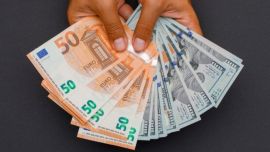Venezuela's regional rivals are to ask the International Criminal Court to investigate Nicolás Maduro's government over alleged crimes against humanity, President Mauricio Macri confirmed this weekend.
"In Venezuela, human rights are systematically violated. They've lost respect for the value of life," Macri told the CNN news channel in an interview. "There is a growing sense that we need to take more forceful action.”
“Maduro has not changed at all. I am not optimistic in the short term of what is going to happen in Venezuela,” he added.
The president said the petition would be filed "in a few weeks" and would also be signed by the presidents of Colombia (Iván Duque), Chile (Sebastián Piñera) and Paraguay (Mario Abdo Benítez), all of whom are politically aligned with the Argentine government.
Macri also poured scorn on Venezuela's claims that Maduro was targeted in an assassination attempt two weeks ago. Seven soldiers were injured after a pair of what the government said were explosives-laden drones blew up around a military parade, after which Maduro claimed they were sent to kill him.
"I don't have exact information but in light of how he's behaved since and given those [opposition leaders] he's flattened and trampled over, it shows that there's not much chance it was genuine," added Macri.
On the notebooks
Turning to matters closer to home and the ongoing "notebook" corruption scandal, Macri said he expects the "whole truth to come to light."
But he denied claims that the scandal, which has embroiled former president and opposition leader Cristina Fernández de Kirchner, was helping his bid for re-election next year.
“I don’t do what helps me, but what benefits the country, and that is having an independent Judiciary.,” he said.
The senator for Buenos Aires Province has been questioned by a judge over allegations her government received millions of dollars in kickbacks from prominent business leaders in order to win large public sector works contracts.
Oscar Centeno, the government driver who allegedly served as the bagman in the scheme kept notebooks with a detailed account of the payments.
Two weeks ago, Fernández de Kirchner's former vice-president Amado Boudou was sentenced to nearly six years in prison for "passive bribery" and conduct "incompatible" with his duties as a public servant.
Macri has not been entirely untouched by the scandal, though. His cousin Ángelo Calcaterra was one of eight business leaders to strike plea bargains over bribes paid during three terms of Kirchnerite governments.
The president admitted he spoke with Calcaterra before the latter struck a plea deal.
"It's always better to go with the truth," said Macri during the CNN interview aired on Sunday night.
He said he was "happy" the scandal had come to light under his administration.
Macri joked that Argentines were watching less programme's on Netflix, because they were glued to their TV screens watching the scandal develop.
No more CCK?
The president also addressed the naming of locations and streets – such as the Kirchner Cultural Centre (CCK) in downtown Buenos Aires, after former presidents Néstor Kirchner and Cristina Fernández de Kirchner – saying the idea "never made sense," saying such an honour was normally given years after individuals had passed on. He confirmed that discussions were underway to rename the CCK.
- TIMES/AFP























Comments